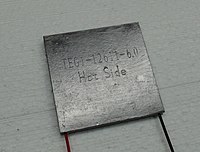
Photo from wikipedia
Bismuth telluride-based thin films have been investigated as the active material in flexible and micro thermoelectric generators (TEGs) for near room-temperature energy harvesting applications. The latter is a class of… Click to show full abstract
Bismuth telluride-based thin films have been investigated as the active material in flexible and micro thermoelectric generators (TEGs) for near room-temperature energy harvesting applications. The latter is a class of compact printed circuit board compatible devices conceptualized for operation at low-temperature gradients to generate power for wireless sensor nodes (WSNs), the fundamental units of the Internet-of-Things (IoT). CMOS and MEMS compatible micro-TEGs require thin films that can be integrated into the fabrication flow without compromising their thermoelectric properties. We present results on the thermoelectric properties of (Bi,Sb)2(Se,Te)3 thin films deposited via thermal evaporation of ternary compound pellets on four-inch SiO2 substrates at room temperature. Thin-film compositions and post-deposition annealing parameters are optimized to achieve power factors of 2.75 mW m−1 K−2 and 0.59 mW m−1 K−2 for p-type and n-type thin films. The measurement setup is optimized to characterize the thin-film properties accurately. Thin-film adhesion is further tested and optimized on several substrates. Successful lift-off of p-type and n-type thin films is completed on the same wafer to create thermocouple patterns as per the target device design proving compatibility with the standard MEMS fabrication process.
Journal Title: Micromachines
Year Published: 2022
Link to full text (if available)
Share on Social Media: Sign Up to like & get
recommendations!